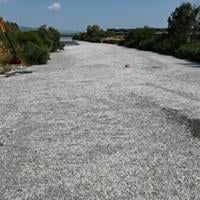Officials in central Greece are working quickly to address a large number of dead fish at a popular port, which locals fear may harm their livelihoods.
This incident marks the second environmental disaster to impact the port of Volos, located north of Athens, following severe floods in the Thessaly region last year.
The devastating floods caused a nearby lake, drained in 1962 to combat malaria, to swell three times its normal size.
“After the autumn storms Daniel and Elias last year, approximately 20,000 hectares (50,000 acres) of Thessaly plains were flooded, leading various freshwater fish to be carried by rivers to the sea,” explained Dimitris Klaudatos, a professor at the University of Thessaly.
As a result, the lake waters have significantly receded, pushing the freshwater fish towards the Volos port, where they cannot survive and are washing up on the beaches.
Authorities have already removed 57 tons of dead fish from the beaches near Volos on Tuesday, with cleanup efforts ongoing.
Local businesses, including restaurants and bars, have reported a decrease of nearly 80 percent in tourist traffic since last year’s flooding, raising concerns about the economic impact.
The president of the local association, Stefanos Stefanou, expressed worry about the situation, stating, “The influx of dead fish will have a negative impact on our city’s reputation. Who would want to visit us after this?”
An investigation has been launched by local authorities to assess the water quality, microbial levels in Lake Karla’s estuary, and potential pollution in the gulf.
str-mr/nth/ju/js





